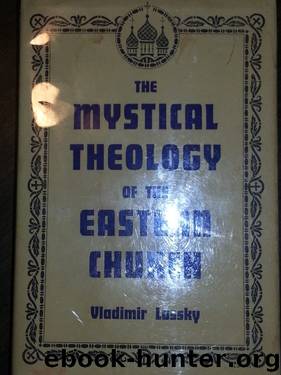The Mystical Theology of the Eastern Church by Vladimir Lossky

Author:Vladimir Lossky [Lossky, Vladimir]
Language: eng
Format: epub
Tags: Religion, Spirituality
ISBN: 9780227905098
Google: kIcSCgAAQBAJ
Amazon: B010OPFH1C
Publisher: James Clarke & Co
Published: 1991-07-31T22:00:00+00:00
CHAPTER SEVEN
The Economy of the Son
* * *
In our examination of the elements of theology which form the basis of the doctrine of union with God in the tradition of the Eastern Church, we have indicated the main outline of the teaching on uncreated being and created being, on God and the creature which are the two terms of the union. We have come to the extreme limits of created being where man is separated from God not only by nature but also by will, creating thus a new existential mode of being, that of sin. For according to St. Gregory of Nyssa sin is an invention of the created will. The infinite distance between the created and uncreated, the natural separation of man from God which ought to have been overcome by deification, became an impassable abyss for man after he had willed himself into a new state, that of sin and death, which was near a state of non-being. In order to reach that union with God, to which the creature is called, it was then necessary to break through a triple barrier of sin, death and nature.
The way to deification, which was planned for the first man, will be impossible until human nature triumphs over sin and death. The way to union will henceforth be presented to fallen humanity as salvation. This negative term stands for the removal of an obstacle: one is saved from something—from death, and from sin—its root. The divine plan was not fulfilled by Adam; instead of the straight line of ascent towards God, the will of the first man followed a path contrary to nature, and ending in death. God alone can endow men with the possibility of deification, by liberating him at one and the same time from death and from captivity to sin. What man ought to have attained by raising himself up to God, God achieved by descending to man. That is why the triple barrier which separates us from God—death, sin, nature—impassable for men, is broken through by God in the inverse order, beginning with the union of the separated natures, and ending with victory over death. Nicholas Cabasilas, a Byzantine theologian of the fourteenth century, said on this subject: ‘The Lord allowed men, separated from God by the triple barrier of nature, sin and death, to be fully possessed of Him and to be directly united to Him by the fact he has set aside each barrier in turn: that of nature by His incarnation, of sin by His death, and of death by His resurrection. This is the reason why St. Paul writes: ‘The last enemy that shall be destroyed is death’ (I Cor. xv, 26).1 For St. Maximus the incarnation (σάρκωσις) and deification (θέωσις) correspond to one another; they mutually imply each other. God descends to the world and becomes man, and man is raised towards divine fullness and becomes god, because this union of two natures, the divine and the human, has been determined
Download
This site does not store any files on its server. We only index and link to content provided by other sites. Please contact the content providers to delete copyright contents if any and email us, we'll remove relevant links or contents immediately.
The Lost Art of Listening by Michael P. Nichols(7494)
Why I Am Not A Calvinist by Dr. Peter S. Ruckman(4149)
The Rosicrucians by Christopher McIntosh(3513)
Wicca: a guide for the solitary practitioner by Scott Cunningham(3167)
Signature in the Cell: DNA and the Evidence for Intelligent Design by Stephen C. Meyer(3132)
Real Sex by Lauren F. Winner(3014)
The Holy Spirit by Billy Graham(2944)
To Light a Sacred Flame by Silver RavenWolf(2814)
The End of Faith by Sam Harris(2733)
The Gnostic Gospels by Pagels Elaine(2527)
Waking Up by Sam Harris(2454)
Nine Parts of Desire by Geraldine Brooks(2361)
Jesus by Paul Johnson(2352)
Devil, The by Almond Philip C(2325)
The God delusion by Richard Dawkins(2305)
Heavens on Earth by Michael Shermer(2278)
Kundalini by Gopi Krishna(2180)
Chosen by God by R. C. Sproul(2161)
The Nature of Consciousness by Rupert Spira(2104)
